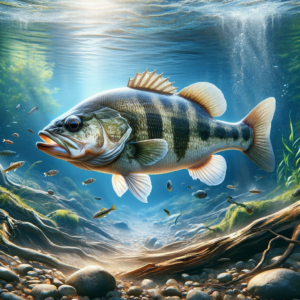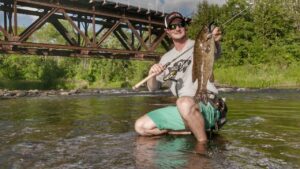Have you ever wondered about the ecological impact of smallmouth bass on native fish populations? It’s a topic that may not be commonly discussed, but it’s an important one nonetheless. Smallmouth bass, while a popular game fish, can actually pose a significant threat to the native fish in the same habitat. In this article, we will delve deeper into why smallmouth bass are considered a problem and explore the various ways in which they can affect native fish populations.
When it comes to smallmouth bass, their aggressive feeding behavior and ability to outcompete native fish species are major concerns. Smallmouth bass are opportunistic predators, meaning they will eat a wide range of prey, including other fish. This can disrupt the natural balance of the ecosystem, as they can deplete the populations of smaller, native fish. Additionally, smallmouth bass are highly adaptable and can thrive in a variety of habitats, allowing them to spread and potentially outnumber native fish in certain areas.
The impacts of smallmouth bass on native fish populations can extend beyond just direct predation and competition for resources. They can also alter the structure and composition of the habitat itself. Smallmouth bass are known to create nests and depressions on the riverbeds during the spawning season, which can disrupt the natural sediment distribution and potentially impact the reproduction of native fish species. Furthermore, their presence can also lead to changes in the behavior and distribution of other aquatic organisms, creating a ripple effect throughout the entire ecosystem.
In conclusion, smallmouth bass can have a significant ecological impact on native fish populations. From outcompeting native fish for resources to altering the structure of the habitat, their presence can disrupt the delicate balance of an ecosystem. Understanding and addressing this issue is crucial for the conservation and management of native fish populations, ensuring the long-term health and biodiversity of our waterways. In the upcoming parts of this article, we will delve further into the specific ways in which smallmouth bass can affect native fish populations and explore potential management strategies.
The ecological impact of smallmouth bass on native fish populations
Introduction to smallmouth bass
Smallmouth bass (Micropterus dolomieu) are a popular sportfish native to North America, known for their aggressive behavior and hard-fighting nature. However, their introduction to non-native habitats has had significant ecological impacts, particularly on native fish populations. In this article, we will explore the various ways in which smallmouth bass affect native fish species and the overall balance of ecosystems.
Smallmouth bass behavior and characteristics
Smallmouth bass are characterized by their bronze-colored bodies and dark vertical bars. They prefer clear, cool, and rocky streams, rivers, and lakes. Smallmouth bass are opportunistic feeders and have a diverse diet that includes crayfish, insects, smaller fish, and even small mammals or birds. Their adaptability to various habitats and voracious appetite contribute to their success as invasive species.
How smallmouth bass interact with native fish populations
The presence of smallmouth bass in non-native habitats can lead to competition, predation, displacement, and habitat alteration, all of which have significant effects on native fish populations.
Competition for resources
Smallmouth bass compete with native fish species for limited resources such as food and shelter. Their aggressive feeding behavior and ability to consume a wide range of prey items give them a competitive advantage over native fish. This can result in reduced food availability for native species, leading to stunted growth, decreased reproduction rates, and overall population decline.
Predation on native fish species
Smallmouth bass are opportunistic predators and can prey on a variety of small fish species. Their presence in non-native habitats can introduce a new predator into the ecosystem, disrupting the natural prey-predator dynamics. Native fish species may not have evolved defenses against smallmouth bass predation, making them vulnerable to population declines or local extinctions.
Effects of smallmouth bass on breeding patterns
Smallmouth bass are broadcast spawners, laying adhesive eggs on hard surfaces such as rocks or logs. This behavior can lead to nest-site competition with native fish species that also rely on similar habitat characteristics for breeding. The aggressive nature of smallmouth bass may result in the displacement of native fish during spawning, reducing their reproductive success and negatively impacting population dynamics.
Displacement of native species
Smallmouth bass have been known to outcompete and displace native fish species in non-native habitats. Their ability to thrive in a wide range of environmental conditions and their aggressive feeding behavior can lead to the decline or eventual extinction of native fish populations. This displacement can have cascading effects on the entire ecosystem, as native fish species play vital roles in maintaining ecological balance.
Habitat destruction and alteration
Smallmouth bass are known for their nest-building behavior, which involves creating and defending nests for egg deposition. This behavior often leads to habitat destruction and alteration, as smallmouth bass remove vegetation, disrupt underwater structures, and degrade the quality of spawning grounds for native fish species. These changes in habitat composition can further impact the survival and reproduction of native fish populations.
Ecosystem-wide consequences
The ecological impact of smallmouth bass extends beyond their direct interactions with native fish populations. As apex predators, smallmouth bass can indirectly influence the entire food web structure. Their presence can result in changes in prey abundance and composition, which can impact other trophic levels. This disruption can have far-reaching consequences on the functioning and stability of entire ecosystems.
Conclusion
Smallmouth bass, while revered for their recreational value, pose significant ecological threats to native fish populations. Their competitive nature, predatory behavior, displacement of native species, habitat destruction, and alteration have detrimental effects on the delicate balance of ecosystems. Understanding these impacts and implementing effective management strategies are crucial for the conservation and restoration of native fish populations and the overall health of our aquatic ecosystems.




